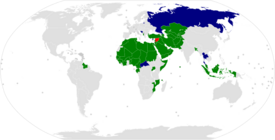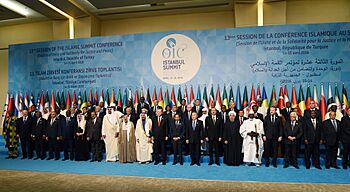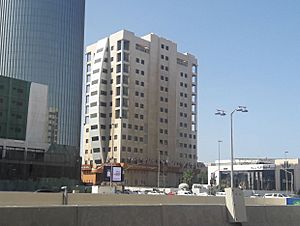Organisation of Islamic Cooperation facts for kids
Quick facts for kids
Organisation of Islamic Cooperation
|
|
|---|---|
|
Motto: "To safeguard the interests and ensure the progress and well-being of Muslims"
|
|

Member states Observer states Suspended states
|
|
| Administrative centre (Headquarters) | |
| Official languages | |
| Type | Intergovernmental organization |
| Membership | 57 member states |
| Leaders | |
|
• Secretary General
|
Hissein Brahim Taha |
| Establishment | |
|
• Charter signed
|
25 September 1969 |
| Population | |
|
• 2018 estimate
|
1.81 billion |
| GDP (PPP) | 2019 estimate |
|
• Total
|
$27.949 trillion |
|
• Per capita
|
$19,451 |
| GDP (nominal) | 2019 estimate |
|
• Total
|
$9.904 trillion |
|
• Per capita
|
$9,361 |
| HDI (2018) | medium · 122nd |
The Organisation of Islamic Cooperation (OIC) is a big group of countries that work together. It was started in 1969. It has 57 member states, and most of them are countries where many people are Muslim.
The OIC says it is "the voice of the Muslim world." It works to protect the interests of Muslim countries. It also tries to help bring peace and understanding around the world. The OIC has offices at the United Nations and the European Union. Its main languages are Arabic, English, and French. In 2015, the countries in the OIC had over 1.8 billion people living in them. This is almost a quarter of the world's population.
Contents
History of the OIC
How it Started
The OIC was formed after a fire at the Al-Aqsa Mosque in Jerusalem on August 21, 1969. This event made Muslim leaders want to work together more closely. On September 25, 1969, leaders from 24 Muslim countries met in Rabat, Morocco. They agreed to help each other in areas like money, science, culture, and faith.
Six months later, in March 1970, the first meeting of Foreign Ministers was held in Jeddah, Saudi Arabia. In 1972, the Organisation of the Islamic Conference was officially created. Later, it changed its name to the Organisation of Islamic Cooperation (OIC).
Many Muslims had wanted a group like this for a long time. They wanted a way to work on shared political, economic, and social goals. This idea became stronger after the Ottoman Empire ended after World War I.
What the OIC Aims For
The OIC's main goals are to:
- Keep Islamic social and economic values strong.
- Help member countries be more united.
- Work together in social, economic, cultural, scientific, and political areas.
- Support international peace and safety.
- Improve education, especially in science and technology.
The OIC's logo has three main parts: the Kaaba, the Globe, and the Crescent. These parts show what the group believes in and what it wants to achieve.
Changes to the Charter
In 1990, the OIC adopted the Cairo Declaration on Human Rights in Islam. This was a guide for human rights in member states, based on Islamic law (Sharia).
In 2008, the OIC updated its rules. The new rules aimed to promote human rights and good government in all member states. The updated rules also supported the Charter of the United Nations and international law.
On June 28, 2011, the group changed its name from "Organisation of the Islamic Conference" to "Organisation of Islamic Cooperation." They also got a new logo.
Helping Refugees
The OIC countries have helped many refugees. By the end of 2010, they hosted 18 million refugees. They have also taken in people fleeing conflicts, like the Syrian civil war. In 2012, the OIC held a meeting to talk about how to help refugees in Muslim countries.
Member States
The OIC has 57 members. Most of these countries are also members of the United Nations. The only exception is Palestine.
Some countries are "observer states," meaning they can attend meetings but are not full members. These include Bosnia and Herzegovina, the Central African Republic, Thailand, Russia, and Northern Cyprus.
Africa
Asia
Europe
Americas
OIC's Stances on Issues
Israeli–Palestinian Conflict
The OIC supports a two-state solution to the conflict between Israel and Palestine. This means they believe there should be two independent states: Israel and Palestine.
The OIC has asked people to avoid buying Israeli products. They hope this will pressure Israel to end its control over Palestinian areas. In 2017, after the US decided to recognize Jerusalem as Israel's capital, the OIC held a special meeting. They issued a statement called "Istanbul Declaration on Freedom for Al Quds" (Jerusalem). In 2024, the OIC supported South Africa's case against Israel at the International Court of Justice.
Relationship with India
India has a very large Muslim population, over 200 million people. This is the largest Muslim population outside of Muslim-majority countries. However, India is not a member of the OIC. Pakistan, a founding member of the OIC, has often opposed India joining.
Pakistan has brought up the Kashmir conflict as a reason for its opposition. The OIC has sometimes mentioned Jammu and Kashmir as an area controlled by India. In 2019, after an attack in Kashmir and airstrikes, India's Foreign Minister was invited to an OIC meeting. This was the first time in 50 years. Pakistan boycotted the meeting because of India's invitation.
Cartoons of Muhammad
In 2005, a Danish newspaper published cartoons of Muhammad. Many Muslims found these cartoons offensive. The OIC condemned the publication of the cartoons. This led to protests and violence in some Muslim countries.
Human Rights
The OIC created the Cairo Declaration on Human Rights in Islam. This declaration says that human rights must follow Islamic law. Critics say this declaration goes against the Universal Declaration of Human Rights (UDHR).
In 2008, the OIC created the Independent Permanent Human Rights Commission (IPHRC). This group advises the OIC and monitors human rights in member states. It also helps promote political, civil, and economic rights.
In 2017, the IPHRC spoke out against human rights violations against the Rohingya Muslims in Myanmar. In 2019, the OIC praised China for its treatment of Uyghur Muslims. However, some Muslim groups later criticized the OIC for not speaking out against the abuse of Uyghurs.
LGBT Rights
In 2012, the OIC spoke against a discussion at the United Nations about sexual orientation and gender identity. They said it was against religious teachings. Most Arab countries and some African countries walked out of the meeting.
However, some OIC members like Albania and Suriname have signed a UN statement supporting LGBT rights. Also, in countries like Bahrain and Turkey, homosexuality is legal.
Non-state Terrorism
In 1999, the OIC adopted a plan to fight international terrorism. However, some experts say the OIC's definition of terrorism is too broad. It could include peaceful actions like expressing opinions or holding meetings.
The OIC also says that "peoples' struggle... against foreign occupation" is not terrorism. For example, they have said that the Palestinian fight with Israel is not terrorism. They have also called Islamophobia (fear or hatred of Islam) "the worst form of terrorism."
Dispute with Thailand
The OIC has criticized Thailand for how it treats Muslim people in its southern provinces. The OIC said that Thailand's security approach could make the situation worse.
Thailand's foreign minister said the violence was not about religion. He said the government protects all its citizens. Human rights groups like Human Rights Watch have also raised concerns similar to the OIC.
Important Meetings
Ninth Meeting of PUOICM
In February 2007, the Parliamentary Union of the OIC Member States (PUOICM) met in Kuala Lumpur, Malaysia. One main topic was stopping Israel from digging near the Western Wall in Jerusalem. They also talked about sending peacekeeping troops to Muslim states.
Emergency Meeting on Hamas-Israeli War
On November 11, 2023, the OIC and the Arab League held a special meeting in Riyadh. They discussed the difficult situation in Gaza due to the 2023 Israel–Hamas war.
How the OIC Works

The OIC's main office is in Jeddah, Saudi Arabia. It also has smaller offices in cities like New York and Geneva.
The OIC supports several universities, including the Islamic University of Technology in Bangladesh and the Islamic University in Uganda.
The OIC has different parts that help it work:
Islamic Summit
This is the biggest meeting. It brings together the leaders of all member states every three years. They make important decisions and guide the OIC's work.
Islamic Conference of Foreign Ministers
The foreign ministers of member states meet once a year. They check on how well the OIC's decisions are being carried out.
Secretary General
The Secretary General is the main leader of the OIC. They are chosen by the foreign ministers for five years and can serve a second term.
Permanent Secretariat
This is the OIC's main office in Jeddah. It helps carry out the decisions made by the leaders and foreign ministers.
Other Groups
The OIC also has many other groups that focus on specific areas like:
- Research and training (in Ankara, Turkey)
- Islamic history, art, and culture (in Istanbul, Turkey)
- Trade (in Casablanca, Morocco)
- Islamic law (in Jeddah, Saudi Arabia)
- Education, science, and culture (in Rabat, Morocco)
List of Summits
| Number | Date | Country | Place |
|---|---|---|---|
| 1st | 22–25 September 1969 | Rabat | |
| 2nd | 22–24 February 1974 | Lahore | |
| 3rd | 25–29 January 1981 | Mecca & Ta’if | |
| 4th | 16–19 January 1984 | Casablanca | |
| 5th | 26–29 January 1987 | Kuwait City | |
| 6th | 9–11 December 1991 | Dakar | |
| 7th | 13–15 December 1994 | Casablanca | |
| 1st Extraordinary | 23–24 March 1997 | Islamabad | |
| 8th | 9–11 December 1997 | Tehran | |
| 9th | 12–13 November 2000 | Doha | |
| 2nd Extraordinary | 4–5 March 2003 | Doha | |
| 10th | 16–17 October 2003 | Putrajaya | |
| 3rd Extraordinary | 7–8 December 2005 | Mecca | |
| 11th | 13–14 March 2008 | Dakar | |
| 4th Extraordinary | 14–15 August 2012 | Mecca | |
| 12th | 6–7 February 2013 | Cairo | |
| 5th Extraordinary | 6–7 March 2016 | Jakarta | |
| 13th | 14–15 April 2016 | Istanbul | |
| 6th Extraordinary | 13 December 2017 | Istanbul | |
| 7th Extraordinary | 18 May 2018 | Istanbul | |
| 14th | 31 May 2019 | Mecca | |
| 8th Extraordinary | 19 December 2021 | Islamabad | |
| 48th session of Council of Foreign Ministers | 22 March 2022 | Islamabad | |
| 9th Extraordinary | 18 October 2023 | Jeddah | |
| 15th | 4 May 2024 | Banjul |
See also
 In Spanish: Organización para la Cooperación Islámica para niños
In Spanish: Organización para la Cooperación Islámica para niños
- Cairo Declaration on Human Rights in Islam
- Flag of the Organisation of Islamic Cooperation
- Islamic University of Technology
 | Calvin Brent |
 | Walter T. Bailey |
 | Martha Cassell Thompson |
 | Alberta Jeannette Cassell |




